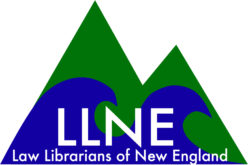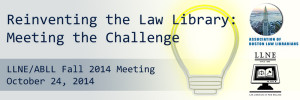At every annual meeting I’ve ever been to, the programs have been a mixed bag. But reliably, the highlights have always been the roundtables – opportunities to sit with colleagues in a (semi-)formalized setting and discuss issues, learn about innovations others have implemented, and share strategies for solving common problems.
At the Marketing and Outreach RoundTable earlier today I sat with a group discussing specific marketing tools and examples. We talked about Newsletters as outreach tools, and agreed that in order for these to be read there really had to be a hook: The Georgia Bulldogs, for example, run a “LawDogs” contest, where people submit photos of dogs, and the “winning” photo is printed in the newsletter. At SMU they have “Loo Notes,” which is – you guessed it – library news posted in “the ‘loo.” These broadsides contain trivia questions, the answer to which are submitted to the circulation desk and make on eligible for a raffle.
Folks also talked about doing programs for faculty and students on using library resources – those recently acquired, or those whose interfaces have recently changed (like THAT ever happens). Again, we agreed there has to be a hook – usually food – to get folks to attend.
Finally – in terms of faculty – we talked about different ways to be more…present in faculty consciousness – from being present near faculty offices (offering cookies, or just checking printers), to facilitating TWEN access, to showing up at faculty works-in-progress talks, to taking places on faculty committees.
As far as marketing to students, people seemed to be a bit more creative, and successful. Several folks check out materials other than books and computers – for example, frisbees, hula-hoops, sports equipment or umbrellas. Others give things out during orientation – USB drives, lunch bags, even reusable library coffee mugs with the promise (eventually fulfilled) of free coffee during finals time. Someone from Georgia talked about the tremendous success they had with “luncheon learns,” where they would provide pizza for students along with some kind of programming – often, but not always, library related (e.g. “taking care of yourself during finals,” or “what to do BEYOND law school.” ) He reported that they had a startling 60-70 students at these events!
One of the librarians present talked about essentially being the library candy fairy, strolling through the library at various times delivering pieces of candy and good cheer (e.g. “great work – you can do it” or “happy day, from your friends at the desk.”). She said that students reacted as though she were dolling out gold ingots.
Some of the other “extras” offered to students in the name of marketing:
- Coffee Breaks during finals (see the aforementioned “Library coffee mugs.”)
- A “Petting Zoo” in the quad (don’t try this in the city, unless your menagerie is entirely pigeons and squirrels)
- An oatmeal “breakfast bar” during finals time
- “Relax in the Stacks” 7-15 minute massage in the library
- And just because that last one bears repeating: FREE MASSAGE IN THE LIBRARY!
Again, the greatest value of the annual meeting is the opportunity to talk to colleagues doing similar work in different parts of the country. Librarians tend to be very smart folks doing hard work with great humor.





